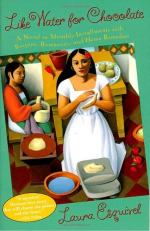|
This section contains 6,884 words (approx. 23 pages at 300 words per page) |

|
SOURCE: “Ritual and ‘Sacred Space’ in Laura Esquivel's Like Water for Chocolate,” in Confluencia: Revista Hispánica de Cultura y Literatura, Vol. 12, No. 1, Fall, 1996, pp. 106–20.
In the following essay, Fernández-Levin analyzes the metaphors and symbolism found in Like Water for Chocolate and how Tita, the novel's protagonist, transforms the drudgery of the kitchen into a magical experience.
Laura Esquivel’s novel Like Water for Chocolate resonates with metaphors that cannot be extricated from Mexican culture, its social conventions and myths. The novel allows readers to follow the metamorphosis of the protagonist, a young Mexican woman named Tita, who undergoes a prodigious transformation in an uncommon space, a kitchen. The kitchen and the recipes the protagonist concocts act as a symbolic and linguistic narrative catalyst that not only enables the character’s process of empowerment but also points to specific social and cultural dilemmas. Human duality, the conflict...
|
This section contains 6,884 words (approx. 23 pages at 300 words per page) |

|


